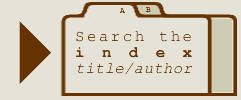| |
Featured
Talks
Humanities
in the Information Age: Lessons for the Cool
The Lawrence Willson Memorial Lecture, California Lambda
of Phi Beta Kappa Initiation, UCSB, June 1, 2002
by:
Alan Liu
[excerpt:]
Why is it important for general society that the humanities
to engage with information technology? The speculative answer,
upon which I would like to conclude, is this: by itself, "cool"
is not enough to deal with the contemporary life of knowledge
work so as to make of it a fully humane life (i.e., what the
ancient philosophers called the "good life" not just in the
material but in ethical senses of the word "good"). The humanities
surely do not have all of the answers; but they can contribute
one part of the answer to the question of what is the "good
life" in the age of knowledge work. That answer is that "cool"–which
by itself can be a shallow, narrow, even cruel (as in the
common high-school judgement that "either you're cool, or
you suck")–needs the complement of a historical view
of the technological life in order to be more humane.
That,
I speculate, must be the larger answer to the question: why
should the humanities engage with technology?
(Full
text of talk)
After
9/11: Wiring Networks for Security and Liberty
Consortium of Humanities Chairs, U. Minnesota, Dec.
2001
by:
William Warner
[excerpt:]
The events of 9/11 have dealt a powerful shock to this project.
It is forcing us to ask difficult new questions about the
utility and dangers of intelligent networks and the global
communication of information. My talk this morning will seek
to do three things: first, understand how the attacks on 9/11,
and the subsequent anthrax attacks, have succeeded in compromising
our networks; second, suggest how early American communication
networks played a central role in winning American independence
from the British Imperial system. Finally, I will end this
talk by arguing that 9/11 should not mean that we reconfigure
American networks by bartering away our liberty in the name
of security. Instead, in the wake of 9/11, we should think
through ways to make our networks more secure by making them
more robust, more extensive, and more intelligent.
(Full
text of talk)
All
Talks / Essays
|
|
|
Browse
All Talks

Recent Talk/Essays
 The Object as Code Technoptopias conference,
Univ. of Strathclyde, Glasgow, July 2002, and trAce Writing
Conference, Nottingham Univ., July 2002
The Object as Code Technoptopias conference,
Univ. of Strathclyde, Glasgow, July 2002, and trAce Writing
Conference, Nottingham Univ., July 2002
Rita
Raley
 Presentation of Alan Liu's book on The
Laws of Cool: The Culture of Information at the UCSB Center
for Information Technology & Society, Nov. 2, 2001
Presentation of Alan Liu's book on The
Laws of Cool: The Culture of Information at the UCSB Center
for Information Technology & Society, Nov. 2, 2001
Alan
Liu
 "Making the
Internet a Matrix for the Humanities: Projects and Issues"
U. Alberta, May 17, 2002
"Making the
Internet a Matrix for the Humanities: Projects and Issues"
U. Alberta, May 17, 2002
William
Warner
 Presentation at Digital Cultures Project Summer
Institute, June 22, 2001
Presentation at Digital Cultures Project Summer
Institute, June 22, 2001
Robert Adlington, Jeremy Douglass, Alan
Liu
 The
Tribe of Cool: Information Culture and History, Realvideo
Webcast of keynote address at ACH-ALLC conference, NYU, June
16, 2001 The
Tribe of Cool: Information Culture and History, Realvideo
Webcast of keynote address at ACH-ALLC conference, NYU, June
16, 2001
Alan
Liu
 Historicizing Information, eHumanities series
at the NEH, Washington, D.C., May 1, 2001
Historicizing Information, eHumanities series
at the NEH, Washington, D.C., May 1, 2001
Alan Liu
|
|